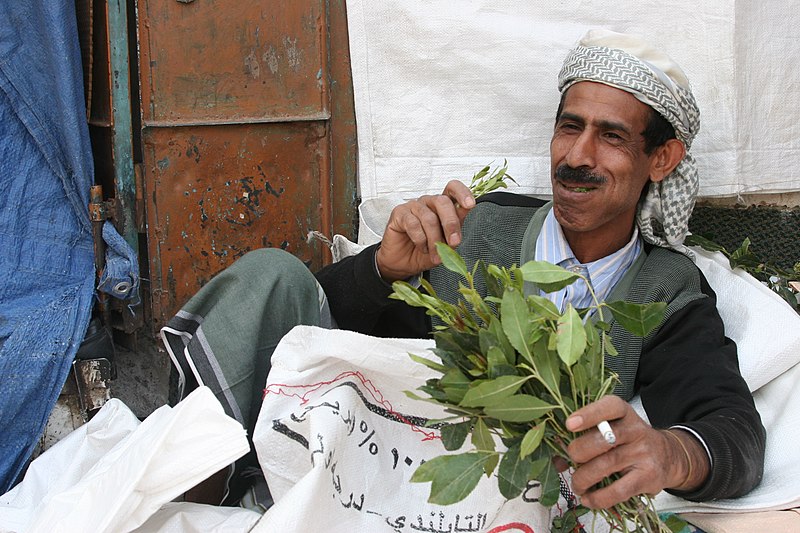Krazy khat

Man chewing khat in Sana'a, Yemen, January 2009
Catha edulis, commonly called Arabian tea,[1] khat,[1] qat, gat, is a flowering plant native to the Horn of Africa and the Arabian Peninsula. Among communities from these areas, khat chewing has a long history as a social custom dating back thousands of years.[2]
Khat contains a monoamine alkaloid called cathinone, an amphetamine-like stimulant, which is said to cause excitement, loss of appetite and euphoria.
In 1980, the World Health Organization (WHO) classified it as a drug of abuse that can produce mild to moderate psychological dependence (less than tobacco or alcohol),[3] although the WHO does not consider khat to be seriously addictive.[2] The plant has been targeted by anti-drug organizations such as the DEA.[4] It is a controlled substance in some countries, such as the United States, Canada and Germany, while its production, sale and consumption are legal in other nations, including Djibouti, Ethiopia, Somalia and Yemen.[5]...
Regulation
In 1965, the World Health Organization (WHO) Expert Committee on Dependence-producing Drugs' Fourteenth Report noted, "The Committee was pleased to note the resolution of the Economic and Social Council with respect to khat, confirming the view that the abuse of this substance is a regional problem and may best be controlled at that level".[35] For this reason, khat was not Scheduled under the Single Convention on Narcotic Drugs. In 1980, the WHO classified the plant as a drug of abuse that can produce mild to moderate psychological dependence (less than tobacco or alcohol),[3] although the WHO does not consider khat to be seriously addictive.[2] It is a controlled or illegal substance in some countries, but is legal for sale and production in others.
Ethiopia
Khat is legal in Ethiopia.[5]
Somalia
Khat is legal in Somalia.[5]
Djibouti
Khat is legal in Djibouti.[36]
Kenya
Khat is legal in Kenya. However, two of its active components, cathinone and cathine, are classed as Class C substances.[37]
Israel
Khat is consumed by older Mizrahi Israelis, and the raw plant is available for sale in several open markets. A cocktail of Arak and minced frozen khat, mixed with grapefruit juice, has become popular in the south of the country in recent years.
United States
In the United States, cathinone is a Schedule I drug, according to the U.S. Controlled Substance Act. The 1993 DEA rule placing cathinone in Schedule I noted that it was effectively also banning khat.
The plant itself is specifically banned in Missouri.
